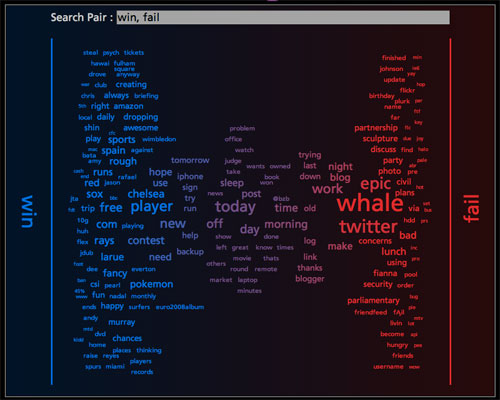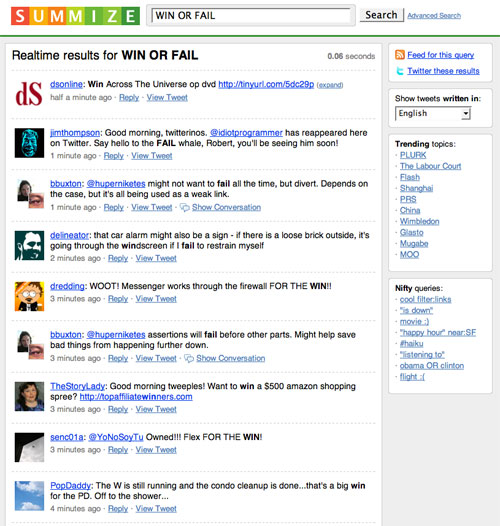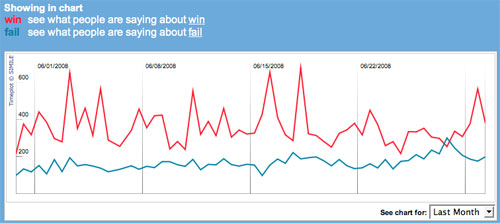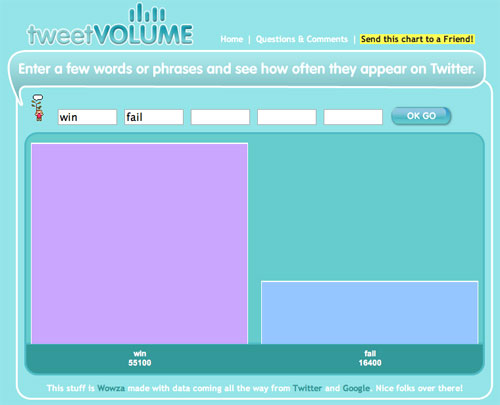FTW (“For The Win”): An enthusiastic emphasis to the end of a comment, message, or post. Sometimes genuine, but often sarcastic. Originated from the game show Hollywood Squares where the result of the player’s response is expected to win the game. [Urban Dictionary]
The term ‘Win’ and its antonym ‘Fail’ have outgrown their origin in FTW. In (extremely) current slang, they are used to denote all aspects of success and failure, and have been both adjectivised (“Incredibly win”) and quantified (“Full of fail”): the ultimate accolades of the emergent argot.
I’m not going to apologise for the ephemeral nature of this subject: the increasingly digital domain of our discussions means that real-time speech – the best indicator of current thought and opinion, is increasingly index- and search-able. The Oxford English Corpus, which is used to create and update our dictionaries, is a collection of texts of written (or spoken) language currently totalling over 2 billion words of 21st-Century English.
A strength of the corpus is that it contains not only published works in which the text has been edited (and made to conform to standard spellings and grammar) but also unpublished and unedited writing like emails and weblogs. Some of the most inventive uses and deliberate exploitations of language, not to mention common-or-garden mistakes, start out in this kind of informal and unselfconscious language, so tracking them is an essential part of tracking the language as a whole.
That definition again: “unpublished and unedited writing like emails and weblogs”. Some might find an argument here.
Slowly, the internet becomes the corpus. With projects as diverse as Google’s Books and Scholar, and Summize, we are indexing everything.
Win and Fail are inherently digital concepts: there is no grey area here, only the TRUE/FALSE dualism of 1 and 0. So they are the natural interjections of the techie. Stephen Pinker says:
I’m very interested in language because it reflects our obsessions and ways of conceptualising the world. Swear words are a window on to the domains of life that arouse the strongest emotions: bodily secretions, powerful deities, death, disease, hated people or groups and depraved sexual acts.
It’s likely that taboo words are stored in the right hemisphere of the brain. Massive left hemisphere strokes or the entire surgical removal of the left hemisphere can leave people with no articulate speech other than the ability to swear, spout cliches and song lyrics.
What this implies to me – and I am not a cognitive scientist, although I did study in this area – is that these ‘taboo’ words are not ‘mere’ words, simply labels for things. They are inherently emotional terms, carrying with them not only the thing itself, but an entire web of meanings and associations. ‘Win’ and ‘fail’ are ejaculations shorn of their taboo aspects – politically correct, but also precise and targeted.
Trends over time can be microsearched. What happened at 22:10 on June 27th to cause that brief triumph of fail? Almost exactly two days later, ‘win’ spikes again.
Failure, while undesired, is also funnier. Schadenfreude has its zenith in the latest lolcat-variation: the Ship of Fail and its attendants, or in the much-maligned, but equally celebrated Fail Whale. Luckily, Win seems to be winning.
P.S. On the images: I love visualisations, and Twitter is a rich data source (bkkeepr owes its existence to them and it, of course). An honourable mention should go to Twistori, which, lovely as it is, lacks win/fail categories.




it’s = it is
(you got it wrong twice, in this post alone.)
-bowerbird
Comment by bowerbird — July 2, 2008 @ 12:24 am
Thank you, and corrected. One of my own pet hates, so quite inexcusable. There goes my credibility on the unedited front…
Comment by James Bridle — July 2, 2008 @ 8:23 am
Thanks for sharing, that is the coolest thing! :)
Comment by Phil — July 2, 2008 @ 10:52 am